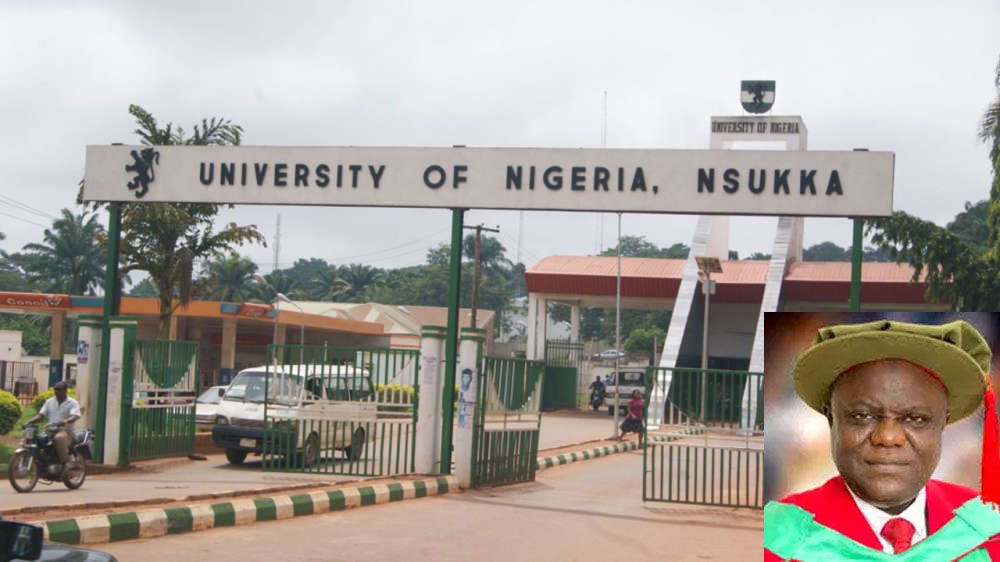“I will be firm, fair, and transparent in the discharge of my duties. UNN must not lag behind in the current technological revolution, characterised by the rivalry between OpenAI and DeepSeek,” he assured.

A total of 4,491 qualified teachers under the Borno State Local Government Education Authority are now enjoying the monthly payment of N30,000 minimum wage with effect from August, 1, 2022.
The Borno State Governor, Prof. Babagana Zulum, stated this, saying he had approved the immediate implementation of the N30,000 minimum wage to the teachers.
The State Government under the leadership of Governor Zulum faced accusations on the social media last week that teachers working with public primary schools received monthly salary between N7,000 and N11,000 as take home pay.
Governor Babagana Zulum who just returned from Japan after an official engagements gave the approval while having meeting with the chairmen and members of the state civil service and local government service commissions, Head of Service, as well members of Nigerian Union of Teachers (NUT), and Nigeria Labour Congress (NLC) at the Government House, Maiduguri on Wednesday.
Zulum also said promotion benefits of all state civil servants would be implemented from January 2022 to 2023 after a promotional examination, stressing that if Yobe State could conduct promotional examination, nothing should stop Borno from doing so.
“The problems in the state civil service and the local government service commissions are enormous. Many people could not understand the complexity of problems we have at hand, but I assure you we are going to sit down and address them with time.”
He lamented that about 3,000 teachers on the payroll of the LEA in the state did not have any qualified certificate, talk less of experience to teach, but assured that those trainable would be trained.
“We will take 1,000 unqualified teachers that are trainable to be undergo training at the Colleges of Education Waka Biu and Bama, while others will be trained in collaboration with National Teachers Institutes (NTI) for six months, and when pass the competency test, they will be observed into the system,” he said.
Borno State Chairman of the NLC, Yusuf Inuwa, commended Governor Zulum for the payment of 2020 leave grant to the state civil servants and assured him of the labour continued industrial harmony and support.

Chicago University clarifies US visa revocation policy for international students
However, the University of Chicago has provided clarification to help ease these concerns for students on F-1 or J-1 visas.
Revocation means your visa is no longer valid and cannot be used to re-enter the U.S.

UNN appoints Prof Olayiwola Usman as first Yoruba DVC (Academics)
The University of Nigeria, Nsukka (UNN) has appointed Professor Kamoru Olayiwola Usman, a Yoruba Muslim from Oyo State, as Deputy Vice-Chancellor (Academics), marking the first time in the institution’s history that a person of Yoruba descent has held the position.
The appointment, made by the Acting Vice-Chancellor (Ag. VC), Professor Oguejiofo T. Ujam, is part of ongoing reforms aimed at fostering inclusive governance and restoring the university’s academic excellence.
In a statement issued yesterday in Abuja, the university reaffirmed its commitment to merit-based leadership and national unity.
Professor Ujam stated: “The appointment of Professor Usman reflects our resolve to prioritise competence over sectional considerations. It is imperative that we sustain this culture of inclusivity and meritocracy to move the university forward.”
In addition to Professor Usman’s appointment, the Acting VC also named Dr Mansur Adebowale Saddiq as Acting Director of the Medical Centre, further demonstrating his commitment to promoting excellence over sectional interests.
Both appointments have been widely welcomed by scholars and students from diverse backgrounds, recognising them as steps towards strengthening national unity within the institution.
READ ALSO:
Professor Usman, who succeeds Professor Urama, holds a PhD in Mathematics Education and previously served as Provost of the Federal College of Education (Special), Oyo State, from 2015 to 2023.
A distinguished academic, he is a fellow of the Mathematical Association of Nigeria and a member of several professional bodies, including the National Institute of Policy and Strategic Studies and the Nigerian Educational Research Association. His initial tenure as DVC (Academics) will last for two years, with the possibility of renewal.
Meanwhile, the statement also highlighted that during a recent University Senate meeting, Professor Ujam emphasised the collective responsibility of repositioning UNN as a centre for ethical and innovative learning.
“A collective effort is required to place the institution on a steady path towards ethical and innovative learning. UNN must regain its pride of place as Nigeria’s premier university. We must rid the system of narrow-minded sectionalism and divisive tendencies that have eroded the enabling environment for research, comparative studies, and the adaptive application of new knowledge,” the statement read.

FG to pay corps members backlog of delayed N77,000 allowance
The Federal Government has promised to pay the backlog of the new ₦77,000 monthly allowance to members of the National Youth Service Corps (NYSC).
The corps members’ allowance was increased from ₦33,000 to ₦77, 000 in September 2024.
However, the new rate has yet to be implemented.
Minister of Youth Development, Ayodele Olawande, on Monday said serving corps members and those in the scheme when the increment was announced in September 2024 would receive a backdated payment.
He gave the assurance when he was featured on Channels Television’s Politics Today.
He said, “You saw the new DG saying that you will get it, and they’re asking him a question ‘What about those that are going out now, are they going to receive it [backlog]?’ He said ‘We have your details’,” the minister said.
“The backlog, we will work on it and make sure it is paid. It may not be immediate but it will happen.”


Breaking: Moon sighted in Saudi, UAE, others, Eid-Fitr holds Sunday


Ramadan ends in Nigeria, Sultan announces March 30 as Eid-el-Fitr


Fubara reacts as Ex-HOS, Nwaeke accuses him of bombing oil pipelines, Rivers Assembly


Barbaric mass burning of innocents in Edo, by Farooq Kperogi


Embrace environmental sanitation during Eid-Fitr, LAGESC boss tells Lagosians


Ex-Rivers HoS wife cries for help over husband’s safety


In pictures: Eid celebrations around the world


Natasha: Emmanuel Uduaghan threatens to sue Senator Nwaebonyi